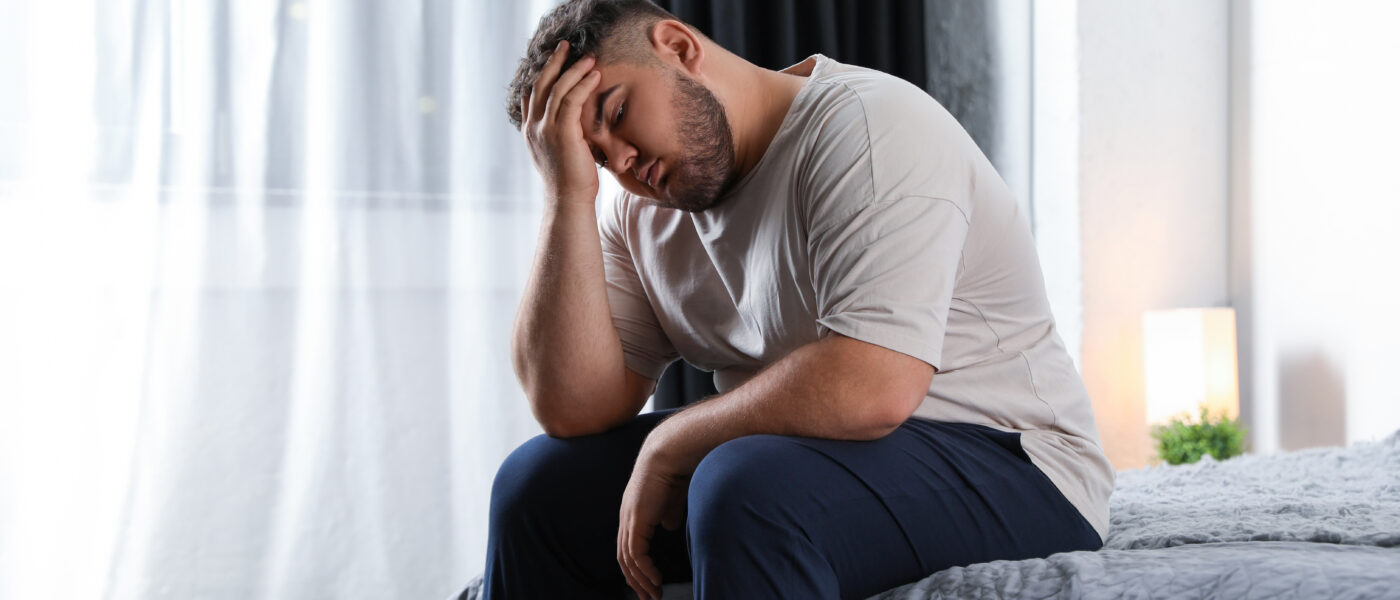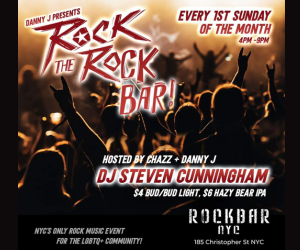Dr. Dan’s Tips and Strategies for Bears Dealing with Depression
May is Mental Health Awareness Month so there’s no better time to begin our work with Dr. Daniel Deason, a licensed and practicing psychologist who also happens to be a bear. For his first column with us he explores depression, something we have all dealt with in varying degrees at one point or another in our lives. If there are any specific issues or questions you have for Dr. Dan, please let us know in the comments below or drop us an email at editor@bearworldmagazine.com.
One of the best ways I have ever heard depression described was by an old supervisor of mine, back when I was working in Mississippi. He described depression as a “constellation” of symptoms, in that depression can be best viewed as a grouping of mental health symptoms that, together, manifest depression. Generally speaking, depressive symptoms can include sadness, feelings of hopelessness, fatigue, significant weight loss or weight gain, diminished interest or pleasure in most activities, sleeplessness or excessive sleep, feelings of worthlessness, and even thoughts of death and suicide.
Now, unlike the actual constellations, any one person’s depression may be a different or unique grouping of these symptoms, and the frequency of them may be persistent (as in, almost every day) or in “episodes” of about two weeks before improving again. Depression can be rooted in external (such as trauma or other major life events) and internal factors (such as having an imbalance of Serotonin in the brain) or some mix of the two. It’s also important to note that depression does not always outwardly look like sadness, sometimes it manifests more as irritability and anger, especially for men. Lastly, these symptoms cause major life problems, such as interfering with work, school, or other daily life tasks or roles. If you’re wondering if you have diagnosable depression, your best bet is to seek out a licensed and qualified mental health provider (as this article isn’t meant to diagnose yourself).
For my fellow Ursa Majors, some is known about depression in gay-identified men, but frankly not nearly as much when compared to our heterosexual counterparts. There is even less research into how depression impacts bears specifically. Some research has indicated that gay men may experience depression three times as much as the general population, and are at higher risk for suicide, substance abuse, and risky sexual behavior. There are a lot of factors as to why gay men experience depression at such a high rate compared to others, including experiences of homophobia, discrimination, and other forms of prejudice.

The lack of specific research on bears and depression is likely due to the fact that bears are a very specific sub-group of gay men that have a constantly evolving definition of ‘what a bear is’ which relies heavily on self-identification. That being said, given that bears are stereotypically larger-sized or heavier set men, disordered eating, weight gain and related health issues are common concerns for bears who experience depression. Bears may also experience ridicule and feel ostracized from the gay community at large for our weight or body shape and size. Further, just as in society at large, racism and racial prejudice both in and outside the gay community are also very real and harmful experiences for bears who have intersecting identities as racial or ethnic minorities. The few studies about the mental health of bears that do exist are predominantly conducted on white men, which further erases the experiences of many men of color who identify with the bear community.
Now, what’s a depressed bear to do? There are a few resources I’d like to talk about, in addition to offering you some tips that you could implement in your daily life. Firstly, let’s discuss talk therapy and medications. There isn’t a one-sized fits-all solution to depression, so it may take some exploration to discover what works best for you. One of the best online resources for finding a therapist is through Psychology Today, which allows you to search for therapists based on your zip-code and specific mental health concerns. I also want to mention, since many of my clients have told me they have avoided therapy because of financial reasons, that if you click “price” and then “sliding scale fees,” Psychology Today will show you a list of providers that will adjust the price of your sessions based on your actual income. This typically makes the cost of therapy much cheaper than the usual out of pocket expenses.
In addition to therapy, there are also medication options to consider such as anti-depressants; a course of treatment which typically starts with a conversation with your medical provider. Another tip I’ll offer related to medication is this: it’s not uncommon at all for folks to try more than one anti-depressant medication, as often it becomes a process of trial and error to figure out which medication works best for you. Sadly, many people try one anti-depressant, and if it does not work well, they swear off all of them for good. This trial and error can understandably be a frustrating process, but finding the right medication for you can significantly improve symptoms of depression. There is evidence to suggest that anti-depressants have a genetic component, meaning that a depression medication that worked for a parent or sibling may also work well for you. There are even services dedicated to helping you figure out on a genetic level which medication may work well for you.
Now, if you’re a little unsure about talk therapy or medications, I’d like to offer some tips that may help in the meantime. Consider these tools as a “starter kit” for treating depression and remember that these tips are not meant to be personalized medical advice or a replacement for actual treatment with a licensed mental health provider.

(Photo Credit: Christina Victoria/ Unsplash)
Depression often causes us to be sluggish, low energy, and lethargic. One of the harder parts of working on depression is that you essentially need to do the opposite of what your depressed brain is telling you to. The depressed brain tells us to just stay in bed, that taking care of our hygiene isn’t all that important, or that we’ll probably fail at something anyway, so why try at all. Depression can rob us of any sort of structure in our lives, and it can often feel like days begin to melt together. Setting up easy to maintain routines can be very beneficial for your mental health. For example, try to walk outside for ten or fifteen minutes one day per week, or set other easy to achieve goals for yourself. Exercise is very beneficial for mental health, but you don’t have to become an avid-gym goer for the benefits to take effect. Integrating light exercise on a regular basis gives you both a sense of routine and will likely help with the sluggishness often accompanied by depression.
Depression can also make us withdraw from the world around us in terms of responsibilities, friendships, and the other roles we take on in our personal lives. Try to resist this feeling as much as you can, as further isolating and withdrawing tends to only worsen depressive symptoms. In psychology we often talk about a sense of “mastery or achievement” being important for treating depression. That is, doing something that gives us a feeling of accomplishment, working on a particular skill, or doing something we feel we are good at.
There’s of course a thought or cognitive aspect to depression as well. Perhaps we talk to ourselves negatively in our minds, are quick to think about the worst possible outcomes to a situation or make negative assumptions as to how others might think of us. Try challenging those thoughts directly when they arise. This is of course more easily said than done, but it is a major component of cognitive-behavioral therapy and is something that you can absolutely practice on your own. Challenge your negative thoughts with logic and evidence. When you notice yourself thinking negatively about yourself, ask yourself, “but do I have evidence for that?” You may think to yourself that nobody loves or cares about you, but do you have concrete evidence for that? You may think that something new may turn out to be horrible, but do you actually know for certain that will be the case? Depression causes us all sorts of cognitive biases and assumptions, and beginning to recognize and challenge them when they arise can be incredibly helpful.
Overall, despite what your depression constellation might look like, there are a wealth of tools and treatments available to you. The hardest part of beginning to work on your mental health can simply be the task of asking for help. Humans can be prideful creatures, including us bears, and it can feel “weak” to ask for help from those around us. However, if you think of the people you’re closest to, would you call them “weak” for asking you for help? Probably not, and the same is likely true if you were to reach out to them for assistance. If you want help, you have to ask for it. Unfortunately, none of us are mind-readers, and you may be surprised at how willing people are to help each other out in times of need.
I hope these tips and information have been helpful to you, and I invite you to feel free to discuss this article in the comments below – I’ll do my best to respond to comments and questions as they come in! Also, what other sorts of mental health issues and concerns pertaining to bears would you like to see here? Let us know down below.
***You must not rely on the information on this website as an alternative to medical advice from your doctor or other professional healthcare provider. If you have any specific questions about any medical matter you should consult your doctor or other professional healthcare provider. If you think you may be suffering from any medical condition you should seek immediate medical attention. You should never delay seeking medical advice, disregard medical advice, or discontinue medical treatment because of information on this website.***

















